First Disclaimer: I received a free early access copy of this RPG in return for an honest review.
Second Disclaimer: The version of the Magonomia manuscript I am reviewing was incomplete at the time of reading and could have its layout, art and text updated or altered before publication. Therefore, I will avoid commenting on layout, grammar, or art as far as possible. Nor will I break the book down chapter by chapter, as these chapters may be changed or shifted around in the final version.
Introduction
What is Magonomia? A word the authors made up meaning magic laws.
More to the point, it’s a roleplaying game about being Elizabethan wizards.
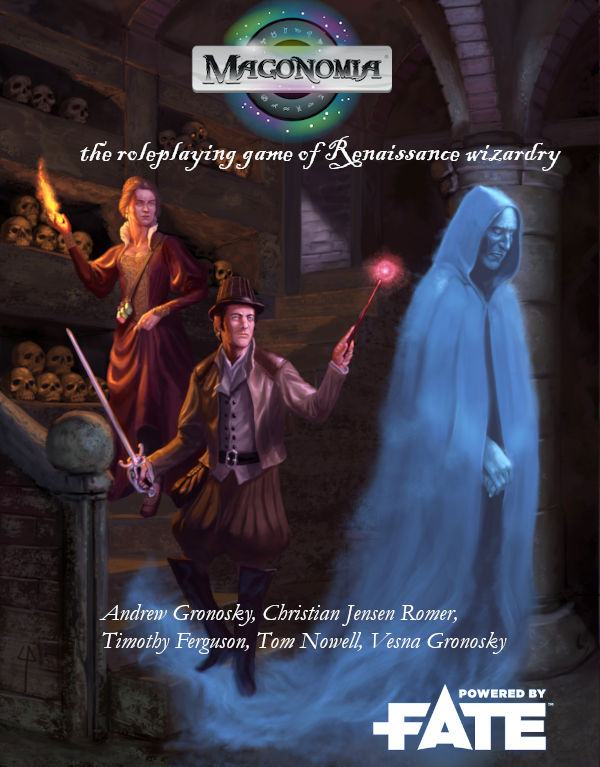 Cast your mind back to the semi-distant past. The glorious and ruthless Queen Elizabeth the First sits on the throne of England, violent religious strife wracks all of Europe and the threat of a Spanish invasion is constant. Courtiers vie desperately for the Queen’s affections (and frequently, for her throne into the bargain). It’s a time of spies and explorers, pirates and playwrights, rebellious lords and dashing highwaymen.
Cast your mind back to the semi-distant past. The glorious and ruthless Queen Elizabeth the First sits on the throne of England, violent religious strife wracks all of Europe and the threat of a Spanish invasion is constant. Courtiers vie desperately for the Queen’s affections (and frequently, for her throne into the bargain). It’s a time of spies and explorers, pirates and playwrights, rebellious lords and dashing highwaymen.
Also, wizards. The most famous of whom is John Dee, court astrologer, genius mathematician and would-be angel-summoner. Perhaps you will become even greater than him, as you master the hidden occult mysteries that govern the universe?
It won’t be easy. All the strange creatures of folklore and myth, song and stage also inhabit this enchanted land. Faerie courts and heraldic dragons, ghosts and phantoms, multi-headed giants and foreign shapeshifters. Not to mention rival magicians.
Magonomia’s rules are based on FATE, a very flexible universal roleplaying system that emphasises unique characters and shared storytelling. FATE is pretty much a blank slate that can be used to build or simulate almost any setting. The authors have used it to build a magic system based on the historical setting, rather than on the conventions of fantasy roleplaying. In other words, this is not D&D transplanted back into 16th Century England. Which works for me—D&D has enough settings already.
Your characters won’t be throwing fireballs, raising skeletons, or creating mirror images of themselves. Nor will they forget a spell as soon as they cast it. Instead, they might summon spirits of air and darkness, treat with mischievous faeries, cast curses, or divine the future through horoscopes.
Style and Philosophy
The book itself is written to be very accessible to new players and GMs. It presumes no knowledge of RPGs and is very friendly and painstakingly conscientious in its language—laying out rules and concepts step by step. The book is packed with practical, sensible, and extensive advice. Concepts are often repeated and re-emphasised, which is excellent for new GMs, but could be a bit dull for more the more experienced. (Although enough new ideas are scattered through all of the information so skipping over it entirely may not be a good idea, even for the experienced GM.)
The authors’ attitude to RPGs is thoroughly modern. The game has a platinum rule: “Every person at the table is responsible for helping to create a good gaming experience for everyone, including themselves.”
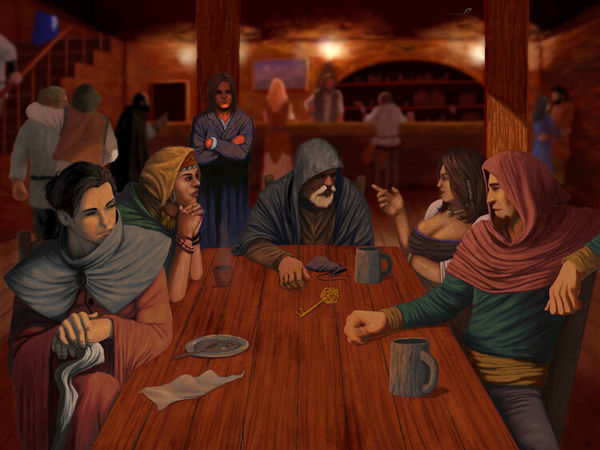
Characters may be of any gender identity, sexuality, ethnicity and so on, and history can be rewritten to allow for the equal treatment of any particular group, if the players would prefer. (The author also points out that Elizabethan England was a more diverse place than it has traditionally been depicted.) All good stuff. When a topic could be risky or problematic, e.g., some form of mind-control, the group must ‘consult the stars’ to see if everyone at the table is comfortable with taking this story forward.
Player characters can only really die if the player agrees this is where they want the story to go. Otherwise, the character is simply captured, knocked out or otherwise compromised. (This suits the mechanics of FATE well, as a character is only killed in a FATE game if they are ‘taken out’ by another character whose controller chooses to kill the victim.)
The system is pretty grounded for a game about wizards. Injuries and afflictions (called Consequences in FATE), require time and treatment to fix. Medicine is heavily linked to magical sciences—a cure might require a horoscope, actions designed to restore the balance of the subject’s ‘humours’, the performance of ritual actions or the tying of an animal part to the afflicted limb.
Magic, FATE and Wizardry
Magonomia stays fairly true to the magical and spiritual beliefs of the period—for example, there are no otherworlds or alternate dimensions. Faeries live in the woods or beneath hills. Heaven is in the sky and Hell is deep beneath the ground. Some adjustments have been made for the purposes of gameplay. Most notably, the magical practices and beliefs of Elizabethan England have been split up into five ‘sciences’. Though these often overlap.
The sciences are Alchemy, Astrology, Sorcery, Theurgy and Witchcraft.
- Alchemy, as described in the book, is the “practice of mystical refinement: awakening hidden magical properties in things and people”. Spells include—mixing potions of sleep or wakefulness, and ultimately turning lead into gold.
- Astrology, in this setting, is far more than a fun way to fill out a few columns in a magazine. It’s the study of the stars and planets in an attempt to divine the future and to alter destiny and fortune in the wizard’s favour. (An amusing historical detail, it was illegal in Elizabethan England to cast the Queen’s horoscope, as the information gained could be used to predict the Queen’s actions or place a curse on the royal person.)
- Sorcery is the mastery of spirits. A dramatic and bombastic form of magic, it’s much like the powers of Prospero the Magician in Shakespeare’s The Tempest.
- Theurgy is both the study of names of power and the art of self-purification in order to gain spiritual authority. It can be used to gain the aid of angels or cast out wicked spirits. (Although both of these terms are somewhat arguable within the setting.)
“Most Renaissance occultists believed new magical powers could only be earned by strengthening or refining their own spirit in some way.”
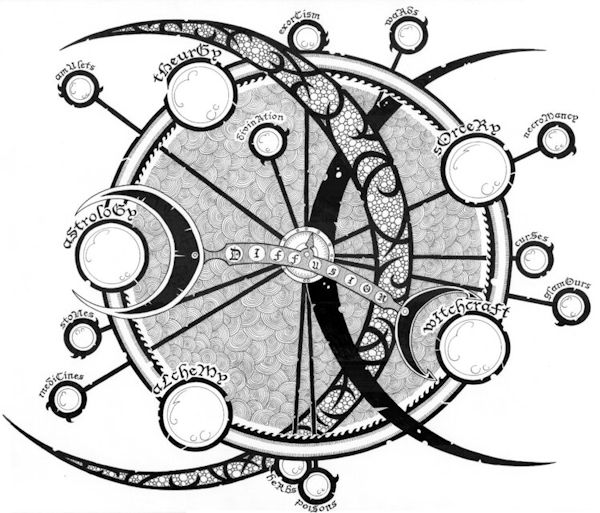
While the other sciences are mostly practiced by the rich and learned, Witchcraft is the magical tradition of the common people. It includes healing and herblore, curses and divination. And, for powerful witches, shapeshifting and prophecy.
There’s a neat little description of the pros and cons of each science and an explanation of why you might want to play that sort of practitioner. Much appreciated!
For all that, the setting is called Enchanted England, actual magical practitioners of significant power are quite rare. (Though you are encouraged to change this fact if you wish to.) Player characters are the exception, they are powerful magicians by the standards of the setting. This is a plus for me—I’m always happy to skip over the early part of a long fantasy campaign where characters battle overgrown rats in basements. Let’s get to the good stuff! But this is a matter of personal taste. It does mean your players will start out with a lot of spells to get to grips with. At least one session zero is definitely required!
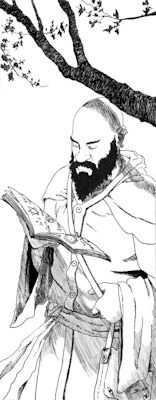 The magic system itself is very intuitive for those who are familiar with FATE but might take a little bit of getting used to for newbies. It’s based around the idea of FATE fractals—everything can be explained through Aspects, Skills and Stunts. A Spell could create an Aspect that has a Skill, and so on.
The magic system itself is very intuitive for those who are familiar with FATE but might take a little bit of getting used to for newbies. It’s based around the idea of FATE fractals—everything can be explained through Aspects, Skills and Stunts. A Spell could create an Aspect that has a Skill, and so on.
Aspects are key facts about a character that can help or hinder them as they progress through a story. Players can earn FATE points by explaining how an Aspect makes the story more difficult or complicates their character’s life and can spend FATE points to gain rerolls or bonuses by invoking those same Aspects. Aspects also define facts about the world—if your Sorcerer has the Aspect of ‘A close friend of John Dee’, you could simply declare they are going to visit Dee and consult with him about something and have that happen, without the need to roll any dice at that point.
Skills represent a character’s abilities—their education, training, talents, and physical, mental, and social prowess. Fighting is a Skill, so is Investigation. Prowess, representing physical strength, is also a Skill. Contacts is a Skill too, representing your web of allies and informants, rather than your character’s personal abilities. When a character interacts directly with the world, and the outcome is in doubt, a Skill roll is generally required. (Particularly if success or failure would be interesting.)
Stunts are powers and talents that grant a bonus or substitute one Skill for another in specific circumstances.
(You get Extras as well, which tend to be things like followers and magical artefacts, but these are pretty much explained with Skills, Stunts and Aspects anyway.)
Confused? Well, let me invent a Spell to demonstrate. Let’s call it Wings of Hermes. If successfully cast, this Spell grants a character the Aspect of ‘Winged Feet’. The character’s player could then spend FATE points to get bonuses or rerolls to any action that would be helped by being able to fly or run fast, such as when running away from bandits. They could also freely perform simple, flight-related, actions such as flying over a small wall or across a pit. The Aspect also has a Skill attached to it: Rank 3 ‘Flight’. A character with this Aspect could roll this Skill to perform feats of flight, such as flying over a pit while trying to avoid being shot by those bandits I mentioned earlier.
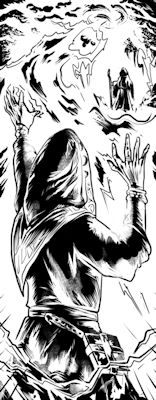 I really like the Spells themselves. They draw on Greek and Arthurian mythology, British and Celtic folklore, history, literature, plays and sometimes from modern culture. They’re really flavourful! Here’s a few at random:
I really like the Spells themselves. They draw on Greek and Arthurian mythology, British and Celtic folklore, history, literature, plays and sometimes from modern culture. They’re really flavourful! Here’s a few at random:
- Out, Damned Spot!
- The Devil’s Steed.
- Geas of Seven Days.
- Malediction by Fire.
- Acumen of Saturn.
- Mask of Uther Pendragon.
- Sending the Library Angel.
(Admittedly, there are also quite a few Spells with unpoetic names, such as ‘Search for Lost Property’).
Spell effects include:
- an enchanted wolfskin that lets you transform into a wolf
- a chemical that dissolves inorganic matter
- the power to bind wind into a handkerchief
- driving out spirits
- commanding spirits of air (or angels or devils) to carry you
- whipping up a lightning storm
Quotes accompany some Spells, and are drawn from such varied sources as Shakespeare, Homer, the King James Bible and Monty Python.
The magic system does have strict limitations in the name of plot-building, gamer safety and (relative) historical accuracy. Certain modern ideas about magic simply weren’t present in the period, such as the power of teleportation. So, they aren’t included, though you are welcome to add them in if you wish. You even get an explanation of how the magic of the setting could be altered.
“Perhaps uncovering some great, but yet unknown, ancient scroll or stone tablet will unlock forms of magic unknown to Renaissance magicians. That’s what the magonomia are: discoveries that change the rules of magic. According to ancient prophecy, there are thirteen magonomia—one for each sign of the Zodiac and one for the Sun itself.”
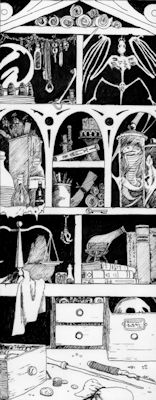 There is considerable detail on the philosophy and nature of magical beliefs at the time. Magic was not a force separate from the mundane world. Instead, like modern science, it was simply the result of understanding the true forces of the universe and of biology. It’s just that in Magonomia those forces aren’t hormones or gravity. No, they’re things like the four elemental humours present in all living beings, and the tendency for comets passing through the Earth’s upper atmosphere to disrupt the dwellings of the angelic lords that govern destiny. (That’s why comets were considered bad luck.)
There is considerable detail on the philosophy and nature of magical beliefs at the time. Magic was not a force separate from the mundane world. Instead, like modern science, it was simply the result of understanding the true forces of the universe and of biology. It’s just that in Magonomia those forces aren’t hormones or gravity. No, they’re things like the four elemental humours present in all living beings, and the tendency for comets passing through the Earth’s upper atmosphere to disrupt the dwellings of the angelic lords that govern destiny. (That’s why comets were considered bad luck.)
The interconnectedness off all things comes up quite a lot as well. The sanguine humour is related to certain emotions, but also to the element of air and so to three of the signs of the Zodiac. A doll made to look like someone, and incorporating their hair, blood, or a piece of their clothing, will have an occult link to that person a wizard can exploit. (Yes, the so-called Voodoo doll originated with European witchcraft. Though similar beliefs are present in several cultures across the world.) Personally, I loved all of this but then I am a history buff with a (purely academic) interest in the occult and supernatural.
“The regions of the atmosphere highest above the Earth, but below the Lunar sphere, are a very strange place according to European occult texts. Here air gradually thins away, and with no fire, water or earth present this is a realm of ethereal light and the deep darkness of space. Here the tiny notes emitted by each of the stars combine into swirls of magnificent music, like a vast chorus singing the praises of God in an alien tongue.”
(I love that quote.)
On the downside, I don’t recall any discussions of grimoires or magical books, which certainly would have existed at the time. That feels like a missed opportunity.
The game provides a vast array of different Spells of divination, as it was very popular at the time. But no Spell can give information the GM is unwilling to hand over and when answers are provided, they tend to be cryptic—a clue towards the solution rather than the solution itself. The idea behind this is it’s fun to go and solve a mystery yourself, rather than having the answers handed to you on a plate. Which is understandable, although players may get frustrated when their incredible Rank 6 Spell of divination still only gives them limited answers or outright fails to work because otherwise it would disrupt the GM’s plan.
Love potions and other violations of consent are either forbidden outright or subject to a consultation of the stars.
Basically, magic is a powerful tool, but it won’t solve all your characters’ problems, they will need to go out and talk to people, sneak into houses in search of clues and perhaps even engage in swordfights and fisticuffs to achieve their ends.
If you and your players are invested in the historical setting, this shouldn’t be a problem. If they’re expecting to be able to use magic to brute-force their way through a situation, they might be happier with high level D&D or a game like Scion: Hero or Age of Sigmar: Soulbound. (Seventh Sea if they’re more into swashbuckling derring-do.)
Character Creation
Character creation is relatively free form, there are no classes or limitations beyond the need to pick just one science to study. Players choose from a list of Skills and assign them values from 1 – 4, indicating how good a character is with that particular ability. (You only get one Rank 4 Skill and are advised to assign it to your magical science, as you’ll need to roll that Skill to cast your Spells!)
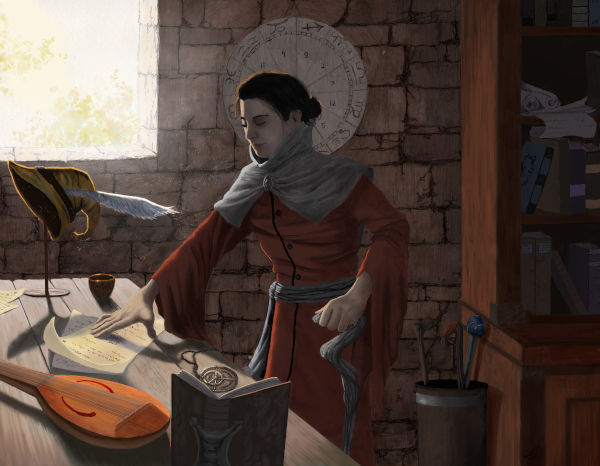
The Skills cover most situations I can think of and are described as part of the historical setting. For example, Archery is a Skill, and the book explains archery practice was actually mandatory for men at the time, so they could be ready to defend England from any threat. (Though most people found ways to avoid archery practice, and early firearms were starting to supplant bows during this period.)
Another Skill, Provocation, is the classic intimidation skill but is also about getting a rise out of someone, tricking them into starting a duel or making a fool of themself at court. It’s accompanied by the immortal line, “Do you bite your thumb at us, sir?”
A handy table explains which actions each Skill can be used for. There are a lot of helpful tools like this in the book.
Players also choose Spells and Aspects. Spells come from a proscribed list. Aspects are invented by the player and are unique to the character.
The end result is one Alchemist could be a doctor, another could be a spy and courtier, while a third could a closeted hermit seeking the key to spiritual transcendence. All with different abilities and play styles. (Again, this is draws on the strengths of FATE, which encourages the creation of unique characters.)
Don’t panic though, Archetypes are provided as a framework for new players to hang their character concepts on if they wish. Character creation is very detailed and includes two separate examples of a character being made, which is excellent.
Setting
Period detail is peppered throughout the book, in descriptions of Spells and Skills, as well as in the chapters dedicated to magical theory and the state of England during the 16th Century. We get information on everything from pub signs to royal palaces.
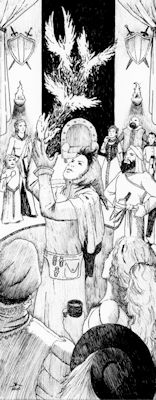 I was surprised to discover, for example, that the higher English aristocracy were almost extinct at this point, wiped out by the Wars of the Roses and subsequent uprisings and infighting. Just one Duke made it into Elizabeth’s reign, and he was executed after trying to marry Mary Queen of Scots and lead an uprising against the crown. Power was much more concentrated around the royal court, so a member of the gentry (wealthy landowners) could gain immense power with the right combination of intelligence, education, cunning and luck. Which is handy for player characters looking to rise to prominence. Though the need to show off wealth and power could leave a seemingly rich courtier struggling to make ends meet.
I was surprised to discover, for example, that the higher English aristocracy were almost extinct at this point, wiped out by the Wars of the Roses and subsequent uprisings and infighting. Just one Duke made it into Elizabeth’s reign, and he was executed after trying to marry Mary Queen of Scots and lead an uprising against the crown. Power was much more concentrated around the royal court, so a member of the gentry (wealthy landowners) could gain immense power with the right combination of intelligence, education, cunning and luck. Which is handy for player characters looking to rise to prominence. Though the need to show off wealth and power could leave a seemingly rich courtier struggling to make ends meet.
A handy timeline provides information about every year of Elizabeth’s reign, and contains a lot of ideas for scenarios based on the events of the period.
The information on the politics and society of England, and of Europe as a whole, is particularly interesting. I loved learning about Mary Frith, who wore men’s clothes, lived a life on the edge of the law and may have been openly asexual at a time when, to my knowledge, that was simply not understood as a real possibility. Another high point is The Fellowship of English Merchants for the Discovery of New Trades (explorers and merchants) who would make excellent adversaries or shadowy mentors/allies.
“The Company’s Governor calls the people he answers to the “adventurers” (a word which means “investors”) but will not say who they are. The Company is not required to tell you who owns it. The Company would consider it politer if you did not ask. The Company must insist.”
There is some information about black people in England at the time. Slavery was illegal on English soil and free black people could hold positions of status or influence, within the confines of the very stratified class system of the age. But this was no golden age of tolerance—English merchants were instrumental in the pernicious slave trade and Queen Elizabeth herself conspired to have free black English people kidnapped and sold into slavery elsewhere in the world, as a way of paying off her debts. (Fortunately, this particular scheme failed.)
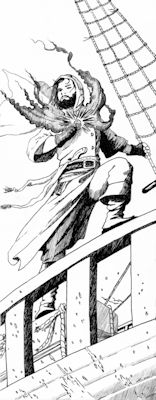 On the international stage we have vicious wars of religion between Protestants and Catholics, fuelled by dynastic disputes and popular uprisings. At the time, Spain ruled an empire that stretched from the Netherlands to the New World. England was a piratical and opportunistic underdog that only avoided being crushed outright due to being just one of many problems plaguing the Spanish titan. (Also, good luck, which put paid to several attempted sea invasions. There was more than one Spanish Armada!)
On the international stage we have vicious wars of religion between Protestants and Catholics, fuelled by dynastic disputes and popular uprisings. At the time, Spain ruled an empire that stretched from the Netherlands to the New World. England was a piratical and opportunistic underdog that only avoided being crushed outright due to being just one of many problems plaguing the Spanish titan. (Also, good luck, which put paid to several attempted sea invasions. There was more than one Spanish Armada!)
My favourite fact was that the former queen (and de facto ruler) of much of France during this period maintained a ‘flying squad’ of beautiful ladies who—seduced monarchs and other powerful people, distracted the French aristocracy from their plots and generally worked as international spies.
There’re also some nice facts about the armour of the time, and an explanation for why suits of armour are displayed in stately homes to this day. Elsewhere, we get details about witchcraft laws, social structures, entertainment, religious politics, and class distinctions. Other interesting snippets include the contemporary myth that the English countryside was littered with lost treasures, and the fact that the distillation of alcohol was relatively new at this time—so, the art of whiskey-making is probably less than 600 years old today.
This game is not meant to be a po-faced exercise in historical realism however (it’s about wizards, after all). The authors constantly emphasise the importance of a good story, of moving the plot forward and of skipping over dull or undramatic actions. Basically, get to the point where you’re battling a hellhound or creeping into the Spanish Ambassador’s residence. To that end it draws on literature, TV, and films to supplement the history and heighten the sense of dramatic adventure.
The magic system also walks this line between grounded reality and dramatic action. There are very definite laws and limitations to magic.
“Spirits in Magonomia are not omniscient, but they possess senses and knowledge that transcend the rational, material world.”
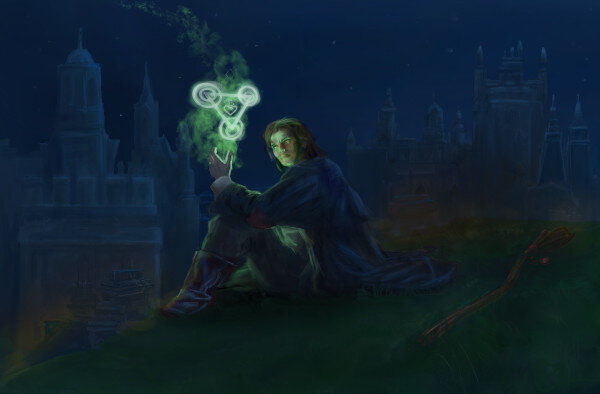
It’s assumed your wizards will spend days, weeks, even years, gathering materials, consulting with spirits, making potions and creating talismans or amulets. Horoscopes must be cast; occult tokens must be gathered. Most of that is left for downtime, however. When a wizard is on a quest, they have all of their Spells to hand. (Unless that wizard needs to do something interesting to prepare for a Spell such as breaking into the tomb of the former Duke of Norfolk to steal some hair from the head of his corpse, to be used in a ritual that will determine whether his line truly did die with him. Or rescuing a Faery Queen’s lover from a Dutch prison, so she will reward the wizard with a horse that can run as fast as the wind.)
“The wizard must have the head of a corpse (the rest of the body is optional) and it must not be significantly decayed.”
I really enjoyed the notes about magically significant places in England. Such as the wry commentary questioning why so many weird and magical events happen in the Forest of Dean. Or the magical heritage of the Isle of Man:
“Mananan MacLeir, for whom the island is named, fled when he lost duel of spells and miracles to Saint Patrick. The merfolk around Cornwall claim to be his vassals, and say he lives yet, on an island that submerges or is hidden in fog, so mortals cannot find it.”
Monsters and Villains
I love a good bestiary. I’m even writing one myself! And I was looking forward to reading one based on Renaissance England.
There is a bestiary and rogue’s gallery in this book. There’s also a separate chapter giving fairly extensive write-ups of specific characters, from two versions of Queen Elizabeth herself, to Mephistopheles, the devil.
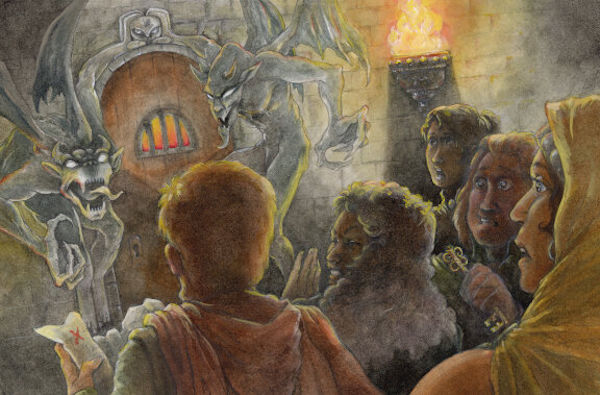
Altogether, it’s not the most extensive or exciting bestiary I’ve seen. (In fairness, it was still under construction at the time of review, with several entries still to be written and little in the way of art. Judging by the promotional pictures on the game’s webpage, I expect the final version will include some cool monster and non-player-character illustrations.)
It’s not a bad bestiary or rogue’s gallery though. The strength of these ‘villain’ sections is in their specificity. These are not generic fantasy monsters. There’s a housecat the size of an actual house. Diseases of the time are written up as actual spirits (as people of the time would have considered them to be). There are specific folkloric dragons, such as the Lambton Worm and the Red Dragon of Wales. Which is, frankly, awesome. It’s incredibly refreshing to imagine going up against a creature from myth and legend, who has quirks and history, rather than a generic dragon who has been colour-coded for my convenience.
 There’s some equally awesome information on regional faery lore. Oberon and Titania and Mab all get a write-up, alongside Puck, Herne the Hunter, Robin Goodfellow and an original villain called Lady Aisling. Gwyn Ap Nudd gets a mention as well, he’s the ruler of the Welsh underworld. There’s also an appearance of the terrifying and legendary phantom hound, Black Shuck.
There’s some equally awesome information on regional faery lore. Oberon and Titania and Mab all get a write-up, alongside Puck, Herne the Hunter, Robin Goodfellow and an original villain called Lady Aisling. Gwyn Ap Nudd gets a mention as well, he’s the ruler of the Welsh underworld. There’s also an appearance of the terrifying and legendary phantom hound, Black Shuck.
The four types of elementals will be very surprising to fantasy buffs, as they are quite different from the modern depictions. Salamanders (fire elementals) are cold, toxic to the touch and eat fire. Sylphs (air spirits) behave more like the standard fantasy depiction of dryads. Love it!
There’s even a ‘historically accurate’ and unsanitised account of succubi. If you have only encountered succubi and incubi in modern fantasy fiction, you may think of them as seductive demons who eat souls. Their original depiction was far earthier and messier, with an emphasis on bodily fluids.
One character is a Hamr—a Nordic shapeshifter who can use a wolfskin to become a wolf. There are no actual werewolves though, which is disappointing, considering the number of times werewolves are mentioned throughout the book.
There are some general faeries, ghosts, criminals, and wild animals as well.
Overall, it’s pretty original and very well researched, and you could get some very interesting and memorable encounters out of this bestiary. It’s certainly worth a look if you want to bring English folklore to your table. I would have liked more monsters, but I am very difficult to please when it comes to bestiaries.
Conclusion
Magonomia is a place in time, a sandbox. The writers clearly have a great love for the material, both historical and mystical, and just wanted to give other people the tools to exist and play in that world. They must have done a huge amount of research into the subject and have succeeded in creating an authentic, ‘living’ representation of another time. It’s a worthy and worthwhile effort.
There’s a lot of support for making your own, unique, historical character. And the game is setup to ensure their story won’t be ended prematurely by a few bad dice rolls or poor decisions. Like a classic adventure tale, adversity just makes for a better narrative! In fact, besides all the occult philosophy and Shakespearean whimsy, the game gave me a strong vibe of old adventure novels like Kidnapped! or The Three Musketeers. It gives me a comfortable feeling of mansions with hidden passages accessed by pulling on fake leatherbound books, or of chasing an enemy of the crown through crowded city streets.
But that’s just me. You might well come away with a very different set of impressions.
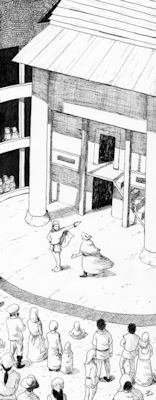 The game offers ideas on what to do in its setting, but no particular judgements on what would make the best story. It’s not really a genre-specific game. Suggested campaign themes include piracy, courtly intrigue, love, the hunt for magical power, and even treading the boards like Shakespeare himself.
The game offers ideas on what to do in its setting, but no particular judgements on what would make the best story. It’s not really a genre-specific game. Suggested campaign themes include piracy, courtly intrigue, love, the hunt for magical power, and even treading the boards like Shakespeare himself.
There are rules for social combat and plot seeds for espionage and romantic adventures, you don’t actually have to physically fight anyone if you don’t want to. The authors simply encourage you to, “Pursue drama and wonder.” They also say:
“Think about whether it’s more fun for your group to roleplay Elizabethan characters who happen to be wizards, or to spend their stories immersed in the strange and the fantastical.”
(Clearly, I believe that being immersed in the strange and fantastical is more fun. It’s in the name of this here website, after all.)
The authors, on the other hand, “As long as the players are invested in the story, you can have as much fun playing matchmaker for the village baker as you can stopping Armageddon.”
Some GMs may wish for more guidance. The book does have plenty of plot seeds and material that will set the right person’s imagination on fire. There is also a single campaign frame, which is a couple of pages of information a GM could develop into a complete scenario. There’s no full adventure or plot-point campaign, however.
I expect full adventures will be available in future. The project has been successfully crowdfunded already and is awaiting general release, theoretically in July 2021. Stretch goals can still be unlocked, and several of them include adventures that would be provided free to backers. I wouldn’t be surprised if those adventures that aren’t unlocked will still be written up, then offered for general purchase at some point. For now, back or buy this game if you think you could build your own adventures on the (extensive) framework provided by the setting.
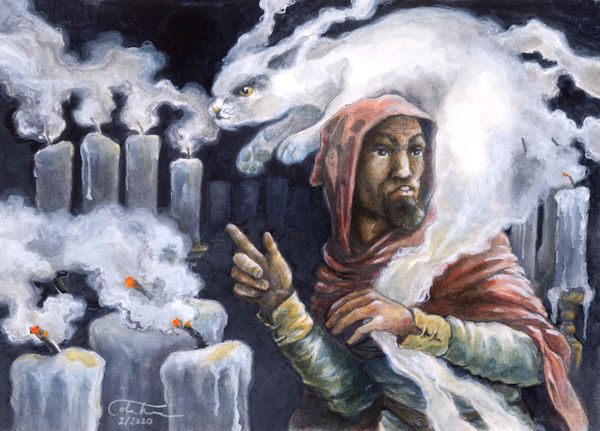
Overall, this is a weighty, scholarly tome that describes its setting very well. It feels like a serious game, interested in authenticity rather than presenting a quirky world or a power fantasy. (Though the authors absolutely want you to have fun within this world.) It’s also a game that’s very focused on storytelling—it always encourages you to change the story if it’s not fun for everyone.
(The authors also deserve props for their commitment to making gaming a safer and more inclusive space.)
If you were already hooked by the idea of Elizabethan wizards, then buy or back this game as soon as you can. No one is ever going to do a better researched, more textured, or more interesting game about Elizabethan wizards. And Elizabethan wizards are great!
If you want to adventure in a setting that is subtly but distinctly different from the classic faux-medieval fantasy worlds, also get this game. If you want to mine a cool historical setting for ideas without having to do your own research, get this game. Similarly, if you want a gamified version of real-world occultism you can easily take apart and apply to your own gaming, this book will be very useful to you. And it has plenty of inspiration! If you love the more fantastical elements of Shakespeare, this game will be great for you too.
And, if nothing else, it’s a unique, lovingly crafted game that takes something old and half-forgotten and makes it into something fresh and exciting and suitable for the modern role-player.


Richard, thanks so much for your kind words and the careful thought you invested in this review!
During final editing we put in some werewolf statistics. 🙂
An intro adventure is now available for pay-what-you-want on DriveThruRPG.com.
https://www.drivethrurpg.com/product/359914/Curse-of-the-OneEyed-Witch-Revised-Edition